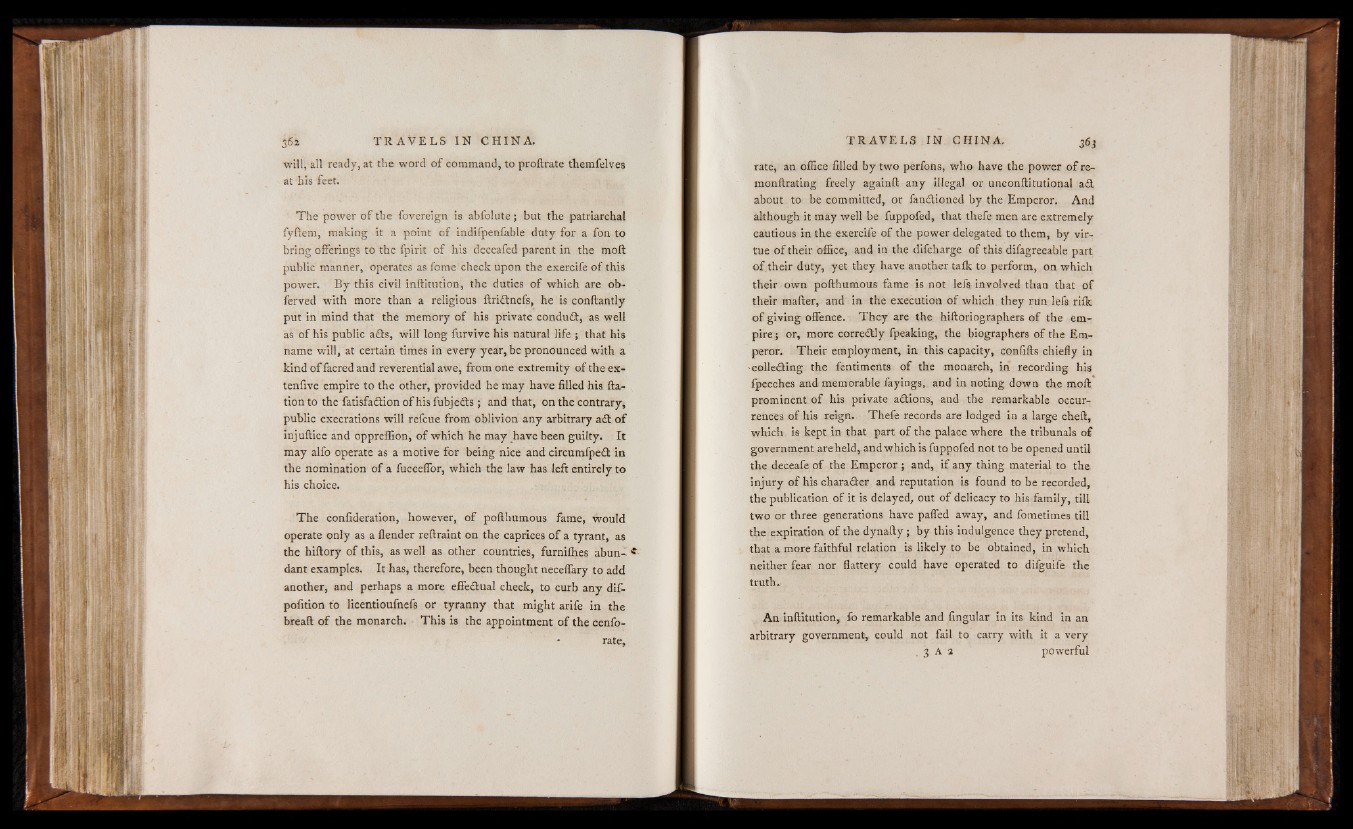
will, all ready, at the word o f command, to proftrate themfelves
at his feet.
The power o f the fovereign is abfolute; but the patriarchal
fyftem, making it a point o f indifpenfable duty for a fon to
bring offerings to the fpirit o f his deceafed parent in the mod
public manner, operates as fome check upon the exercife o f this
power. B y this civil inftitution, the duties o f which are ob-
ferved with more than a religious ftridnefs, he is conftantly
put in mind that the memory o f his private conduit, as well
as o f his public aits, will long furvive his natural life ¡' that his
name will, at certain times in every year, be pronounced with a
kind o f facred and reverential awe, from one extremity o f the ex-
tenfive empire to the other, provided he may have filled his Ration
to the fatisfadlion o f his fubjeits ; and that, on the contrary,
public execrations will refcue from oblivion any arbitrary a it o f
injuftice and oppreffion, o f which he may have been guilty. It
may alfo operate as a motive for being nice and circumfped in
the nomination o f a fucceffor, which the law has left entirely to
his choice.
The confideration, however, o f pofthumous fame, would
operate only as a flender reftraint on the caprices o f a tyrant, as
the hiftory o f this, as well as other countries, furniihes abun- ♦
dant examples. It has, therefore, been thought neceffary to add
another, and perhaps a more effedual check, to curb any dif-
pofition to licentioufnefs or tyranny that might arife in the
breaft o f the monarch. This is the appointment o f the cenforate,
rate, an office filled by two perfons, who have the power o f re-
monftrating freely againft any illegal or unconftitutional a d
about to be committed, or fandioned by the Emperor. And
although it may well be fuppofed, that thefe men are extremely
cautious in the exercife o f the power delegated to them, by virtue
o f their office, and in the difcharge o f this difagreeable part
o f their duty, yet they have another talk to perform, on which
their own pofthumous fame is not lefs involved than that o f
their matter, and in the execution o f which they run lefs rifle
o f giving offence. T h e y are the hiftoriographers o f the empire
; or, more corredly fpeaking, the biographers o f the Emperor.
Their employment, in this capacity, confitts chiefly in
•eolleding the fentiments o f the monarch, in recording his
fpeeches and memorable fayings, and in noting down the moft
prominent o f his private adions, and the remarkable occurrences
o f his reign. Thefe records are lodged in a large cheft,
which is kept in that part o f the palace where the tribunals o f
government areheld, and which is fuppofed not to be opened until
the deceafe o f the Emperor ; and, if any thing material to the
injury o f his charader and reputation is found to be recorded,
the publication o f it is delayed, out o f delicacy to his family, till
two or three generations have paffed away, and fometimes till
the expiration o f the dynafty; by this indulgence they pretend,
that a more faithful relation is likely to be obtained, in which
neither fear nor flattery could have operated to difguife the
truth.
An inftitution, fo remarkable and Angular in its kind in an
arbitrary government, could not fail to carry with it a very
3 A s p ow e r fu l